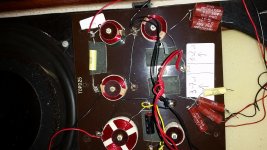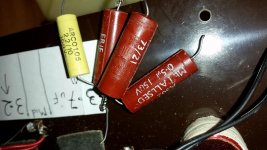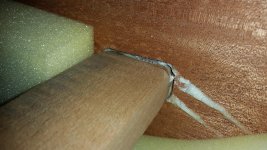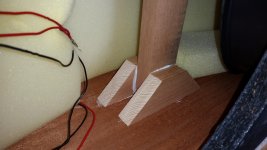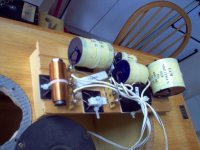Hi there ... thanks for all the help with this 
So I've removed 1 board and the values are
25 uF
2.2 uF
3.2 uF
3.7 uF
Red ones say Metallised on them ...
After reading up what i can ... I'm thinking to get all Alcap low loss .From Falcon acoustics.. If any one thinks this is a bad idea .. Please let me know ASAP
So I've removed 1 board and the values are
25 uF
2.2 uF
3.2 uF
3.7 uF
Red ones say Metallised on them ...
After reading up what i can ... I'm thinking to get all Alcap low loss .From Falcon acoustics.. If any one thinks this is a bad idea .. Please let me know ASAP
Attachments
Whoa! You don't want NP Electrolytics here AT ALL! 
That would be a downgrade. Everything bar the bass 24/25uF is either MKT or MKP already.
The main event would be to replace the electrolytic with MKP. I doubt if a 22uF would sound wrong, but go for 24-25 if you can. Even paralleling a smaller 2.2uF cap to a 22uF would probably be cheapest.
I think we decided that bass circuits benefit most from caps with thicker foils, so 400V might be good for the 24/25uF. The rest can be cheapish 250V MKP.
My Celestion Ditton 44 had back panels that were coming apart from the sides too. You find this a lot with old speakers. I think it's impact damage. Some PVA wood glue round the inside join and a few small wooden blocks at stress points will tighten things up. The old Celestion speaker connectors were pretty rubbish too. People used bell wire back then. You could fit banana plugs. Poor or corroded connections really ruin a speakers sound.
That would be a downgrade. Everything bar the bass 24/25uF is either MKT or MKP already.
The main event would be to replace the electrolytic with MKP. I doubt if a 22uF would sound wrong, but go for 24-25 if you can. Even paralleling a smaller 2.2uF cap to a 22uF would probably be cheapest.
I think we decided that bass circuits benefit most from caps with thicker foils, so 400V might be good for the 24/25uF. The rest can be cheapish 250V MKP.
My Celestion Ditton 44 had back panels that were coming apart from the sides too. You find this a lot with old speakers. I think it's impact damage. Some PVA wood glue round the inside join and a few small wooden blocks at stress points will tighten things up. The old Celestion speaker connectors were pretty rubbish too. People used bell wire back then. You could fit banana plugs. Poor or corroded connections really ruin a speakers sound.
Last edited:
Steve ... now I'm even more confused ..
I thought at the end of the old thread post 20 he said he was thinking of swapping out the new PPs he'd put in for an Alcap ????
"" I'm now trying to decide whether to swap the polyprops I put in the bass filter for alcaps or to add resistors in to try to compensate for the reduced ESR of the PPs. Or something else entirely. Either way, it's been an enjoyable experience and the results so far have been very entertaining indeed. ""
post 21 from old thread
I 'm to tired to make the decision now
I thought at the end of the old thread post 20 he said he was thinking of swapping out the new PPs he'd put in for an Alcap ????
"" I'm now trying to decide whether to swap the polyprops I put in the bass filter for alcaps or to add resistors in to try to compensate for the reduced ESR of the PPs. Or something else entirely. Either way, it's been an enjoyable experience and the results so far have been very entertaining indeed. ""
post 21 from old thread
I 'm to tired to make the decision now
ESR is not an issue here. The bass cap is in series with 8 ohms in the coil, so doesn't matter. We only know that from the schematic. So use a polypropylene. The other caps really shouldn't have deteriorated, though maybe aluminium film corrodes eventually.
I suppose it would be useful to review how capacitor voltage works.
Most amps don't go above +/- 50V rail, so 50V non-polars were OK unless the circuit had a very high Q.
Nevertheless, the NP bass capacitor takes a bit of a hammering usually, and actually warms up because it has a significant resistance of the order of an ohm. Which can evaporate the liquid electrolyte. So they age and deteriorate, maybe.
MKP and MKT have tiny equivalent series resistance, so fundamentally work more predictably. They usually come in 250V, 400V and 630V. Higher voltage, heavier construction.
Non-polars come in 50V, 100V and low loss. Basically big ones work better. They have more power handling.
I think you said you have a dodgy HF2000 tweeter. Really swapping it to the other speaker might be a plan to test it. But be quick with your soldering. They are fragile. Old tweeters weren't good on power handling. Maybe 10W max.
I suppose it would be useful to review how capacitor voltage works.
Most amps don't go above +/- 50V rail, so 50V non-polars were OK unless the circuit had a very high Q.
Nevertheless, the NP bass capacitor takes a bit of a hammering usually, and actually warms up because it has a significant resistance of the order of an ohm. Which can evaporate the liquid electrolyte. So they age and deteriorate, maybe.
MKP and MKT have tiny equivalent series resistance, so fundamentally work more predictably. They usually come in 250V, 400V and 630V. Higher voltage, heavier construction.
Non-polars come in 50V, 100V and low loss. Basically big ones work better. They have more power handling.
I think you said you have a dodgy HF2000 tweeter. Really swapping it to the other speaker might be a plan to test it. But be quick with your soldering. They are fragile. Old tweeters weren't good on power handling. Maybe 10W max.
Last edited:
You calling planet10 an idiot? 
Anyway, sometimes it's best to just have a bash at something and hope for the best.
The other guys thought it was an improvement, and that is the "suck it and see" definition to me.
FWIW, if a tweeter sounds weak, I would definitely reflow the tweeter crossover and wiring. Takes two minutes.
Anyway, sometimes it's best to just have a bash at something and hope for the best.
The other guys thought it was an improvement, and that is the "suck it and see" definition to me.
FWIW, if a tweeter sounds weak, I would definitely reflow the tweeter crossover and wiring. Takes two minutes.
Last edited:
Now I'm even more confused.
Don't overthink this!
Just replace ALL the capacitors with the best film caps you can afford.
'Best' being high voltage polypropylene.
Since you are UK based, I recommend 'Monacor MKP Polypropylene 250V' capacitors from Wilmslow Audio.
Speaker Repair, Speaker Kits, Loudspeaker Repair, Kits and Drive Units, Subwoofer Amplifier Kit
Speaker Repair, Speaker Kits, Loudspeaker Repair, Kits and Drive Units, Subwoofer Amplifier Kit
I've had a good time with Impact Audio and Blue Aran too:
Visaton Crossover Components
Blue Aran - Professional Sound and Lighting > Speaker Components > Crossover Components > Capacitors
They are quite rapid. Something to look out for with the higher voltage and exotic capacitors is they are awkwardly large. I can't tell the difference personally in the sound. I can just hear the difference between Non polars and film types.
Visaton Crossover Components
Blue Aran - Professional Sound and Lighting > Speaker Components > Crossover Components > Capacitors
They are quite rapid. Something to look out for with the higher voltage and exotic capacitors is they are awkwardly large. I can't tell the difference personally in the sound. I can just hear the difference between Non polars and film types.
Last edited:
So I'd just like to say a thanks to every one for all the help ...
So it looks like I will use Solen 400v MKP ..
But I'm still toying with the Idea of using ALCAP 100V low loss for the 24uF
from Falcon ...
I'd like to make the order Today Saturday 28/7./18 .. !! but might hold off till monday ... !!
So it looks like I will use Solen 400v MKP ..
But I'm still toying with the Idea of using ALCAP 100V low loss for the 24uF
from Falcon ...
I'd like to make the order Today Saturday 28/7./18 .. !! but might hold off till monday ... !!
Don't overdo bracing, seriously. Braces sing there own tunes, and not always good ones. A box that flexes is best damped with heavy cork or rubbery stuff glued to the panels. Takes the problems lower in frequency, where they offend less. Which is very BBC.
How many times do I have to say you want a MKP for the bass? Even without digging out the sim I ran, I know there is considerable resistance in that LC circuit. It would be an outrageous notch without resistance.
I have to be careful what I say, but some suppliers are dead slow. Think weeks, and even then some odd substitutions and erratic values.
I was crossovering this morning. I have huge stocks of those lovely old mains 630V MKPs that Maplin used to sell. Great big lumps! Complete overkill.
How many times do I have to say you want a MKP for the bass? Even without digging out the sim I ran, I know there is considerable resistance in that LC circuit. It would be an outrageous notch without resistance.
I have to be careful what I say, but some suppliers are dead slow. Think weeks, and even then some odd substitutions and erratic values.
I was crossovering this morning. I have huge stocks of those lovely old mains 630V MKPs that Maplin used to sell. Great big lumps! Complete overkill.
Attachments
But I'm still toying with the Idea of using ALCAP 100V low loss for the 24uF.
Thought we'd cleared the matter of the 24uF up - no point in using an electrolytic which may deteriorate through time.
But go with what will make you feel content!
Without igniting a flame war, there has NEVER been any serious evidence that exotic capacitors make any difference. I usually use 250V Solens (because I have loads of them), and they are small and easy to solder and won't rattle or fall off too much, being light.
There is a measureable improvement in using air coils rather than non-linear ferrites. There is also evidence that thicker foils (and metal shielding) work better at very low frequencies.
Even cheap ceramic resistors have no significant inductance, though they should be adequate for the job, because resistance changes with temperature by about (guesses...) 0.5% per degree Celsius.
Looking forward to hearing how this one turns out.
There is a measureable improvement in using air coils rather than non-linear ferrites. There is also evidence that thicker foils (and metal shielding) work better at very low frequencies.
Even cheap ceramic resistors have no significant inductance, though they should be adequate for the job, because resistance changes with temperature by about (guesses...) 0.5% per degree Celsius.
Looking forward to hearing how this one turns out.
The internal glue joints had failed on the brace . So I'm just adding 2 glue blocks to each end ..... I'm hoping this will be enuff to restore the joint and not to much ... But some thing needed to be done .Don't overdo bracing, seriously. Braces sing there own tunes, and not always good ones. A box that flexes is best damped with heavy cork or rubbery stuff glued to the panels. Takes the problems lower in frequency, where they offend less. Which is very BBC.
How many times do I have to say you want a MKP for the bass? Even without digging out the sim I ran, I know there is considerable resistance in that LC circuit. It would be an outrageous notch without resistance.
I have to be careful what I say, but some suppliers are dead slow. Think weeks, and even then some odd substitutions and erratic values.
I was crossovering this morning. I have huge stocks of those lovely old mains 630V MKPs that Maplin used to sell. Great big lumps! Complete overkill.
PS thanks for spelling it out about the MPK
Thought we'd cleared the matter of the 24uF up - no point in using an electrolytic which may deteriorate through time.
But go with what will make you feel content!
Thanks for the decisive advice ... its the sort i need ...
This is the conflicting advice from post 20 in the old thread
""
I used low loss because Celestion uses them in their other models, so I felt it appropriate to "upgrade" the caps a little bit. Alcaps are the modern equivalent to Elcaps which they also used in many of their models, so they are a suitable replacement. Some people fear that using different capacitors can change the voicing, and while I disagree to some extent, the Alcaps are inexpensive and are a good replacement for speakers like Celestions if you are concerned about that ""
And the Blurb from Falcon Electronics .. For a slightly later IMF designed Crossover for
""IMF Electronics Professional Monitor 3 ( PM3 ) replacement capacitor set. These are replacement matched pair capacitor sets of toleranced Alcap 100V capacitors or 50V Low Loss type where specified, the best modern equivalent to the black Elcap capacitors originally used by IMF and most UK manufacturers.
""
I am a terrible shopper and always have "" buyers regret ""
All the other models use simple shunt capacitance on bass sections, usually 4th order in Celestion style, which is sensitive to ESR to the extent of about 2dB, because it changes the Q of the filter.
Do you hear it? I think you might hear a bit of harshness on certain notes from, say, Miles Davis' trumpet.
Non-polars certainly sound OK. I have heard loads of speakers with them. And, TBH, I think people like MKP replacements because they are louder. Not because they are hugely better. Non-polars are cheap, especially with large values, which is why manufacturers fitted them.
But here, we have determined that levels won't change. So don't fret.
Do you hear it? I think you might hear a bit of harshness on certain notes from, say, Miles Davis' trumpet.
Non-polars certainly sound OK. I have heard loads of speakers with them. And, TBH, I think people like MKP replacements because they are louder. Not because they are hugely better. Non-polars are cheap, especially with large values, which is why manufacturers fitted them.
But here, we have determined that levels won't change. So don't fret.
Thanks for the decisive advice.
Thank you, it's been fun throwing the ideas about!
I hope you notice an improvement in the sound. If so, I suspect that it will mainly be due to replacing that 24uF capacitor!
Not because you chose an MKP over an Alcap or vice versa, but because the old Elcap was well out of spec and in need of changing!
Please report back on the conclusion of the refurbishment.
There is a difference between the newer pair and the Values from previous posts about 25's ..
my newer pair values seen = 25 uF 2.2 uF 3.2 uF 3.7 uF
and an old thread schematic = 24uF 2 uF 3uF 3.5 uF
The caps in the older thread looked like they were the older Electrolytic type
Any Ideas which values I should go with ?
my newer pair values seen = 25 uF 2.2 uF 3.2 uF 3.7 uF
and an old thread schematic = 24uF 2 uF 3uF 3.5 uF
The caps in the older thread looked like they were the older Electrolytic type
Any Ideas which values I should go with ?
- Status
- This old topic is closed. If you want to reopen this topic, contact a moderator using the "Report Post" button.
- Home
- Loudspeakers
- Multi-Way
- Celestion Ditton 25 help needed
